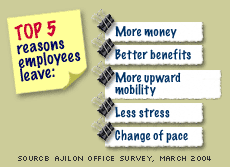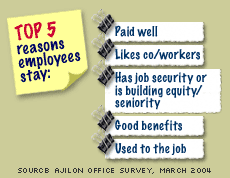NEW YORK (CNN/Money) – Jobs growth in June was a disappointment, all the more so because it came on the heels of three very strong months of jobs creation.
That may put a slight damper on some job hunters' enthusiasm. But the fact that over 1 million jobs have been created since January, most of them since March, has contributed to what employment specialists see as a growing momentum among the gainfully employed to look for new bosses.
After all, the recession combined with heavy layoffs left many folks playing Cinderella on the job: doing more work with fewer resources and often for less compensation.
Still, it's not as if workers are singing a collective refrain of "Take this job and shove it." But there is some evidence to suggest that they're warming up their vocal chords.
Among the latest surveys to address the topic is one from the online job site CareerBuilder, which has a business relationhip with CNN/Money as its exclusive job-listings provider.The survey, conducted in May, found that 20 percent of workers say they plan to change jobs in less than six months. Another 8 percent plan to do so within six to 12 months.
An unscientific poll of 2,646 full-time and part-time workers conducted by another online job site, Yahoo! HotJobs, found that 27 percent of respondents said they are currently looking for another job while 20 percent plan to do so in the next 12 months.
Calls to Ajilon Professional Staffing, meanwhile, have increased in the past quarter compared not only to the same period last year but to the past two quarters.

"With unemployment decreasing, our candidate flow is increasing. Fundamentally, that should be going the other way," said Neil Lebovits, the company's president and chief operating officer. That is, normally you might expect there to be fewer candidates when there are fewer people out of work. That there are more implies people with jobs are looking, too.
In the past two months, the company has had its best permanent-job placement rate in over three years, Lebovits noted. And he has noticed that employees' confidence in their ability to get new jobs has gone up "dramatically."

Spherion, another large staffing firm, also has seen a rise relative to last year in visits to its job boards, replies to its advertisements and returned phone calls to its recruiters, said Spherion president Robert Morgan.
And in its latest report on Job Openings and Labor Turnover, the Bureau of Labor Statistics found that the "quit" rate of workers who voluntarily leave their jobs (not including those who retire) was higher in February, March and April of this year than in the same months in 2003.
Sign of things to come?
Stacey Piefer, a senior account executive specializing in human resource issues at a PR firm, just landed a new job at an advertising agency.
Even though she was looking for a new job for a year, 2003 was a non-starter. "There weren't even opportunities to apply for," she said. "You kept throwing the bait out, but the fish just weren't there."
Not so this year. Within four months, she landed four or five interviews and two job offers.
What's more, the interview process from start-to-finish for the job she accepted was just under two weeks. "I don't know if it was the right place or the right time. It was just a fit," Piefer said, who noted that friends looking for similar jobs have had more protracted experiences.
Why some may jump ship
Among the candidates contacting Ajilon, their reasons for wanting to leave a job are usually stated as money and benefits. But underlying that message, Lebovits believes, is exhaustion and a feeling of being underappreciated.
"They're overworked. They're not feeling the love," he said.
| RELATED ARTICLES
|

|
|
|
|
While money was one reason Piefer started looking for a new job, it didn't top her list. She wanted more work-life balance – in her new post, she can telecommute after three months. She also wanted a more liberal vacation schedule and greater opportunity for advancement.
That squares with what Spherion's Morgan says are among the key reasons lots of employees want new jobs. They're also aware that big pay jumps aren't as easy to come by, he said, so there have to be other compelling reasons to make a move.
Who's got the best chance?
Even though job-search inquiries appear to be on the rise, no one is claiming this is a job-hopper's market or even a weak cousin of the booming job market in the late 1990s.
Don't assume the grass will be greener elsewhere -- it isn't always. Spherion's Morgan recommends that you evaluate why you want to leave your job and make sure you can't get what you want where you are.
If you feel underpaid, be frank with your manager, he suggested. And calculate all the pros and cons of your job – not just wages, but career advancement opportunities, benefits, psychic income and work-life balance issues.
And if you want to make a change, assess your market value.
"If you're good ... you have nothing to lose by looking for the right opportunity. ... If you're top-tier, you'll find a job anywhere," Lebovits said.
But what if you're just okay but not overly marketable? Two months ago, Lebovits recommended you stay put. But now, he said, "I'm more optimistic for that group. It can't hurt to look at this point."
Editor's note: This article, originally published in April, has been updated.

|

